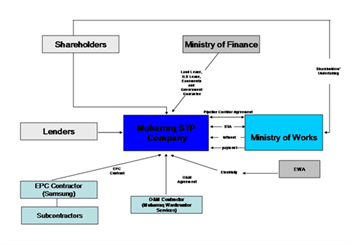Muharraq wastewater project, Bahrain
Bahrain’s Muharraq wastewater project, that reached financial close in mid-2011, is one of the first successful water PPP projects to close in Bahrain so far and has certainly put in place a good blueprint for future water projects to follow.
The project is termed as a ‘pathfinder’ by most of the advisers that worked on it since it reached financial close while the country was in the midst of one of its worst civil unrests spread by the wider Arab Spring in 2011. Political unrests which began in some parts of the Arab world at the end of 2010 quickly spread to others and took full form in Bahrain on 14 February 2011. The civil protests threatened to put both the financing and construction of Muharraq in doubt.
That was also combined with difficulties surrounding credit constriction spread by the continued global financial crisis. However both the project sponsors and financiers were determined to bring the project to a successful close and they did.
The Project: Background & Scope
The US$328 million project was put out to tender in 2009, jointly by, Bahrain’s Ministry of Works and Ministry of Finance and received binding bids by around five consortia in Feb 2010. The authorities chose a preferred bidder in a few months after that in July 2010. The 29-year concession project was awarded to a Samsung Engineering led consortium. The consortium is made up of:
• Samsung Engineering – 45 per cent
• Invest AD – 35 per cent
• United Utilities – 20 per cent
While Samsung’s bid was not supported by commercial banks initially, it did have a strong backing from the Export-Import Bank of Korea (KEXIM) which also picked up the major pile of the debt for the project.
The project involves development, financing, construction, ownership, operation and maintenance of a 100,000m3/day wastewater treatment plant (STP) which is further expandable as need arises.
It also includes a 15.9 km deep gravity sewer trunk main (DGS), wastewater collection network (and dismantling of existing wastewater pumping stations) (WWCN). According to the project’s commercial structure tariff will be paid on basis of available influent treatment capacity, output payment and supplemental payments.
The plant’s operation and maintenance services will be provided by Muharraq wastewater Services (Samsung Engineering 65 per cent, United Utilities 35 per cent) on a fixed price basis for the entire term. The new plant is expected to be operational by 2014.
Challenges
As mentioned earlier the project had to deal with some unique challenges relating to the regional civil unrests as well as global financial uncertainties. Bahrain’s civil unrests came at a time when the project authorities had just about named the Samsung Engineering-led consortium as preferred bidder.
Bahrain’s February 2011 unrests presented a huge obstacle to the project sponsors in-terms of seeking financing and beginning construction on the project. David Wadham, Partner at Ashurst, who advised the sponsors, says that a major part of the impact caused by the unrests was absorbed by the project company through a two month construction extension and a two year term extension.
Civil disturbances in Bahrain even led to credit downgrades (BBB S&P, Baa1 Moody's) for the country. However none of that could stop the successful financial close for the project which got funded by KEXIM and three more commercial banks.
“This was a huge achievement and was a testament to the nerve of both the financial institutions and the sponsors,” says Ben Shorten, Partner at Shearman & Sterling, who acted for the lenders.
The project also faced other challenges relating to land rights and tariff system structuring all of which were dealt with before financial close was achieved.
(Source: Ashurst)
Financing
The project had good backing from KEXIM Bank which was supporting Samsung’s consortium from the beginning and then received additional support from three other MLAs that joined the funding group closer to financial close that took place in July 2011.
The US$328 million project was provided around US$200 million in debt from KEXIM along, which included a US$ 80 million covered facility. Around US$43 million was provided by the three other commercial banks:
• CA-CIB (Technical Bank)
• Natixis (Documentation Bank)
• SMBC (Intercreditor Agent)
Sponsors provided equity of US$ 61 million which brought the debt: equity ratio to around 80:20. The debt has a tenor of 22 years with margins ranging from 225bps to about 275bps over LIBOR.
Advisory roles
HSBC was financial adviser to the authority while Norton Rose was legal counsel. Fichtner was technical adviser. Macquarie provided financial advice to the sponsor and Ashurst gave legal counsel. Shearman & Sterling provided legal advice to the lenders. Hatim Zu'bi and Qay's Zu'bi provided Bahraini law advice to the sponsors and lenders respectively.
Looking ahead
Muharraq’s financial close bodes well for both Bahrain’s Tubli water PPP and Kuwait’s Umm Al Hayman wastewater project – both of which are still in early stages of procurement.
Advisers involved with the Muharraq project believe that the project also stands out for its social significance since the region was in desperate need of a wastewater plant. It is also said to be one of Samsung Engineering’s first PPPs to reach close in Middle East.
Request a Demo
Interested in IJGlobal? Request a demo to discuss a trial with a member of our team. Talk to the team to explore the value of our asset and transaction databases, our market-leading news, league tables and much more.
